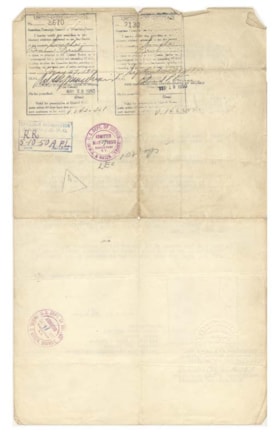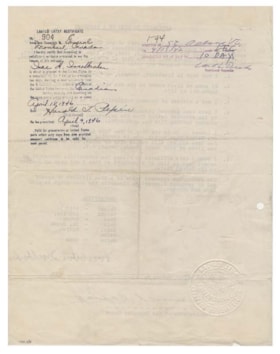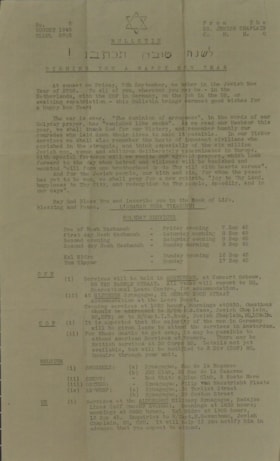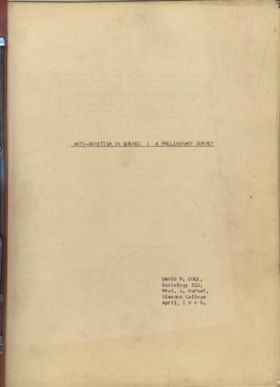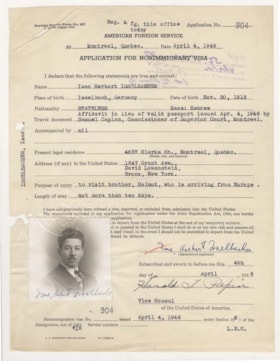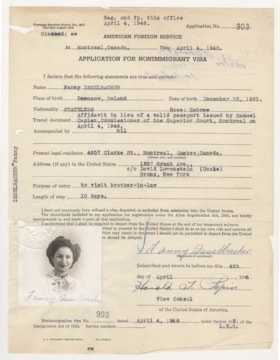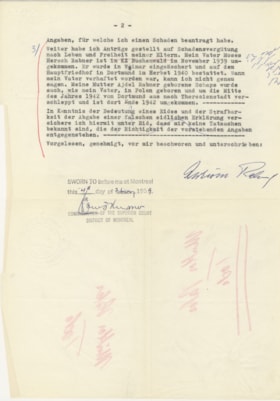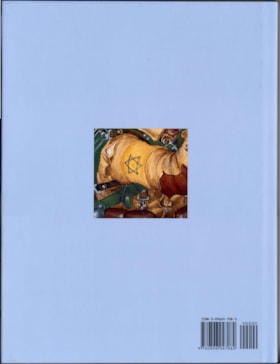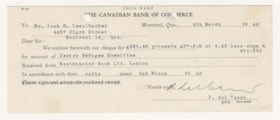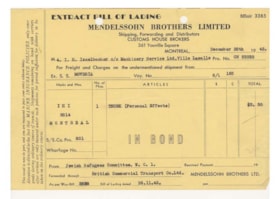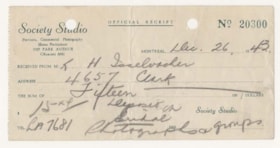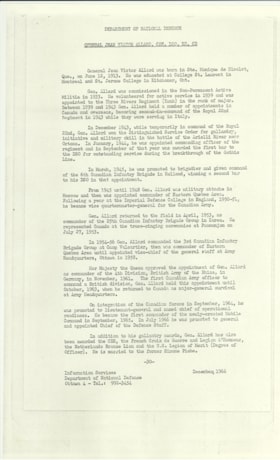Narrow Results By
Place
- Camp B, Canada, North America 2
- Canada (North America) 1
- Canada, North America 23
- Fredericton, Canada, North America 3
- Halifax, Canada, North America 7
- Ile-aux-Noix, Canada, North America 1
- Ile-aux-Noix, Fort Lennox, Canada, North America 4
- Montreal ?, Canada?, North America 1
- Montreal, Canada (North America) 1
- Montreal, Canada, North America 140
- Montréal, Canada, North America 3
- New York; Montreal; Toronto, United States of America; Canada, North America 1
Affidavit
https://www.cjhn.ca/link/cjhn59342
- Collection
- Montreal Holocaust Museum
- Description Level
- Item
- Material Type
- textual record
- Physical Description
- Affidavit : Paper : Typewritten : Ink : Beige, black, grey. ; Ht: 35 cm x W: 21 cm
- Date
- May 23, 1950
- Collection
- Montreal Holocaust Museum
- Description Level
- Item
- Material Type
- textual record
- Physical Description
- Affidavit : Paper : Typewritten : Ink : Beige, black, grey. ; Ht: 35 cm x W: 21 cm
- Other Title Information
- Documentary Artifact
- Date
- May 23, 1950
- Physical Condition
- Good
- Language
- English
- Notes
- Single-sided page with multiple stamps on back, portrait front B.L, signed. Affidavit with photo in to be used in lieu of passport, sworn statement proving the identity of stateless individual in order to travel to the US and return to Canada. Among other statements made, Simcha Kruk states that he has no connection with the Polish Communist Party. Narrative: Simcha-Binem Kruk was born on 1912/8/2 in Lipno, Poland. His parents were Abram Jacob and Esther (nee Dvoyra) Kruk. He fled central Europe to live in Shanghai until he was able to receive a Visa to North America. He moved to Canada on 1948/6/30 and was granted status as a landed immigrant on 1948/8/4. He worked as a barber.
- Accession No.
- 1997.15.06
- Name Access
- Kruk, Simcha
- Archival / Genealogical
- Archival Descriptions
- Repository
- Montreal Holocaust Museum
Images
Affidavit
https://www.cjhn.ca/link/cjhn59408
- Collection
- Montreal Holocaust Museum
- Description Level
- Item
- Material Type
- textual record
- Physical Description
- Affidavit : Paper : Typewritten : Ink : Grey, black, white, purple ; Ht: 28 cm x W: 21,5 cm
- Date
- April 04, 1946
- Collection
- Montreal Holocaust Museum
- Description Level
- Item
- Material Type
- textual record
- Physical Description
- Affidavit : Paper : Typewritten : Ink : Grey, black, white, purple ; Ht: 28 cm x W: 21,5 cm
- Other Title Information
- Documentary Artifact
- Date
- April 04, 1946
- Physical Condition
- Good
- Language
- English
- Notes
- Double-sided page, two holes punched on left edge, staple punctures on top, portrait of cardholder with embossed seal of the Supreme Court on bottom left, creased horizontally and vertically, entitled Affidavit In Lieu of A Passport. Lists seven sworn statements of identity by the card holder, along with a basic physical description. Used as a temporary passport for stateless refugees, valid for one approved journey. Stamps on back contain information about trip. Herbert Isselbacher had to acquire this affidavit to visit his brother in New York City while not yet a citizen of Canada. Narrative: Isaac Herbert Isselbacher was born 1919-11-20 in Isselbach, Germany. His brother was Helmut Isselbacher, born 1921-12-20. Their father was Jacob Isselbacher, born 1883-08-05. They had an uncle and aunt, David and Betty Loewenstein, who lived in New York City with their two children. Isaac left Germany on 1939-07-29, hoping to join his relatives in NYC. He only had the time to get to London, England before the war broke out and started working in a factory. He was arrested at his workplace as an ‘enemy alien’ and sent to Canada for internment in 1940. Isaac was interned in Camp N in Sherbrooke, Quebec. He was drafted into the Works Program Division for woodworking and net-making. In 1940, he received a last letter from his parents which suggested their imminent deportation. After his release, circa November 1942, Isaac worked as a locksmith. He married Fanny Azeff on 1943-12-26 at the Bnai Jacob synagogue in Montreal. Fanny was born on 1921-12-23 in Canada, the daughter of Mr. and Mrs. Harry Azeff. Isaac was naturalized as a Canadian citizen on 1946-06-08. Fanny was naturalized on 1946-08-30 (she had lost her citizenship by marrying Isaac). Isaac’s brother, Helmut Isselbacher, was deported with Transport XXII A from Dossin casern in Mechelen (Malines), Belgium to Auschwitz Birkenau, Poland on 1943-09-20. Of the 2,450 people on the transport, 100 men were selected to work –including Helmut- and the remainder prisoners were gassed. Helmut was made to work as a welder, and was soon fitting new pipes for the gas chamber. He suffered a nervous breakdown as a result. As he was a valued welder, he was transferred to a labour camp in Upper Silesia (Poland) where he remained for two years. As the Russian army advanced, the 6,000 prisoners of this camp were evacuated by train. Helmut remembered being forced to march as the other prisoners died from exhaustion. When liberation was announced, the survivors travelled by ship from Luebeck, Germany, to Sweden with the aid of the Red Cross. After recovery, Helmut decided to remain in Sweden as a welder. Upon learning of his brother’s survival, Helmut travelled to New York in April 1946 to meet with him and their Loewenstein relatives. Afterwards, Helmut travelled to Canada bringing with him a washing machine and bras as late wedding presents for his brother and Fanny. By 1946-08-12, their parents were presumed dead and the two sons inquired into their estate. They received a deed for the land and travelled to the estate to discover that the current owner of their house was their old maid and her son had become the town mayor. Various disputes arose with the current ‘owners’ who believed the Isselbacher family dead. Isaac wished to discuss a settlement, but the mayor’s mother –not realizing Fanny understood German- called the neighbours at work to warn them not to come home as the Isselbacher sons had resurfaced. Payment for the land had reportedly been sent to Israel, though no documentation could be provided.
- Accession No.
- 1999.1.191
- Name Access
- Issley, Jason
- Archival / Genealogical
- Archival Descriptions
- Repository
- Montreal Holocaust Museum
Images
Affidavit
https://www.cjhn.ca/link/cjhn59409
- Collection
- Montreal Holocaust Museum
- Description Level
- Item
- Material Type
- textual record
- Physical Description
- Affidavit : Paper : Typewritten : Ink : Grey, black, white, purple ; Ht: 27 cm x W: 21,5 cm
- Date
- April 04, 1946
- Collection
- Montreal Holocaust Museum
- Description Level
- Item
- Material Type
- textual record
- Physical Description
- Affidavit : Paper : Typewritten : Ink : Grey, black, white, purple ; Ht: 27 cm x W: 21,5 cm
- Other Title Information
- Documentary Artifact
- Date
- April 04, 1946
- Physical Condition
- Good
- Language
- English
- Notes
- Double-sided page, two holes punched on left edge, staple punctures on top, portrait of cardholder with embossed seal of the Supreme Court on bottom left, creased horizontally and vertically, entitled Affidavit In Lieu of A Passport. Lists seven sworn statements of identity by the card holder, along with a basic physical description. Used as a temporary passport for stateless refugees, valid for one approved journey. Stamps on back contain information about trip. Fanny Isselbacher used this affidavit to visit her brother-in-law because she had not yet re-acquired Canadian citizenship. Fanny Azeff was born a Canadian citizen. She lost her citizenship because her husband, Herbert, was stateless. Narrative: Isaac Herbert Isselbacher was born 1919-11-20 in Isselbach, Germany. His brother was Helmut Isselbacher, born 1921-12-20. Their father was Jacob Isselbacher, born 1883-08-05. They had an uncle and aunt, David and Betty Loewenstein, who lived in New York City with their two children. Isaac left Germany on 1939-07-29, hoping to join his relatives in NYC. He only had the time to get to London, England before the war broke out and started working in a factory. He was arrested at his workplace as an ‘enemy alien’ and sent to Canada for internment in 1940. Isaac was interned in Camp N in Sherbrooke, Quebec. He was drafted into the Works Program Division for woodworking and net-making. In 1940, he received a last letter from his parents which suggested their imminent deportation. After his release, circa November 1942, Isaac worked as a locksmith. He married Fanny Azeff on 1943-12-26 at the Bnai Jacob synagogue in Montreal. Fanny was born on 1921-12-23 in Canada, the daughter of Mr. and Mrs. Harry Azeff. Isaac was naturalized as a Canadian citizen on 1946-06-08. Fanny was naturalized on 1946-08-30 (she had lost her citizenship by marrying Isaac). Isaac’s brother, Helmut Isselbacher, was deported with Transport XXII A from Dossin casern in Mechelen (Malines), Belgium to Auschwitz Birkenau, Poland on 1943-09-20. Of the 2,450 people on the transport, 100 men were selected to work –including Helmut- and the remainder prisoners were gassed. Helmut was made to work as a welder, and was soon fitting new pipes for the gas chamber. He suffered a nervous breakdown as a result. As he was a valued welder, he was transferred to a labour camp in Upper Silesia (Poland) where he remained for two years. As the Russian army advanced, the 6,000 prisoners of this camp were evacuated by train. Helmut remembered being forced to march as the other prisoners died from exhaustion. When liberation was announced, the survivors travelled by ship from Luebeck, Germany, to Sweden with the aid of the Red Cross. After recovery, Helmut decided to remain in Sweden as a welder. Upon learning of his brother’s survival, Helmut travelled to New York in April 1946 to meet with him and their Loewenstein relatives. Afterwards, Helmut travelled to Canada bringing with him a washing machine and bras as late wedding presents for his brother and Fanny. By 1946-08-12, their parents were presumed dead and the two sons inquired into their estate. They received a deed for the land and travelled to the estate to discover that the current owner of their house was their old maid and her son had become the town mayor. Various disputes arose with the current ‘owners’ who believed the Isselbacher family dead. Isaac wished to discuss a settlement, but the mayor’s mother –not realizing Fanny understood German- called the neighbours at work to warn them not to come home as the Isselbacher sons had resurfaced. Payment for the land had reportedly been sent to Israel, though no documentation could be provided.
- Accession No.
- 1999.1.192
- Name Access
- Issley, Jason
- Archival / Genealogical
- Archival Descriptions
- Repository
- Montreal Holocaust Museum
Images
Affidavit
https://www.cjhn.ca/link/cjhn59487
- Collection
- Montreal Holocaust Museum
- Description Level
- Item
- Material Type
- textual record
- Physical Description
- Affidavit : Paper : Typewritten : Ink : Brown, black ; Ht: 28 cm x W: 22 cm
- Date
- 1946
- Collection
- Montreal Holocaust Museum
- Description Level
- Item
- Material Type
- textual record
- Physical Description
- Affidavit : Paper : Typewritten : Ink : Brown, black ; Ht: 28 cm x W: 22 cm
- Other Title Information
- Documentary Artifact
- Date
- 1946
- Physical Condition
- Good
- Language
- English
- Notes
- Paper with message written on bottom half, spaces left to include address and details, unsigned. Written as a declaration of intention for bringing goods into Canada. Helmut Isselbacher declares a washing machine that he bought in New York and intends to present to his brother and his bride in Montreal as a late wedding gift. Narrative: Isaac Herbert Isselbacher was born 1919-11-20 in Isselbach, Germany. His brother was Helmut Isselbacher, born 1921-12-20. Their father was Jacob Isselbacher, born 1883-08-05. They had an uncle and aunt, David and Betty Loewenstein, who lived in New York City with their two children. Isaac left Germany on 1939-07-29, hoping to join his relatives in NYC. He only had the time to get to London, England before the war broke out and started working in a factory. He was arrested at his workplace as an ‘enemy alien’ and sent to Canada for internment in 1940. Isaac was interned in Camp N in Sherbrooke, Quebec. He was drafted into the Works Program Division for woodworking and net-making. In 1940, he received a last letter from his parents which suggested their imminent deportation. After his release, circa November 1942, Isaac worked as a locksmith. He married Fanny Azeff on 1943-12-26 at the Bnai Jacob synagogue in Montreal. Fanny was born on 1921-12-23 in Canada, the daughter of Mr. and Mrs. Harry Azeff. Isaac was naturalized as a Canadian citizen on 1946-06-08. Fanny was naturalized on 1946-08-30 (she had lost her citizenship by marrying Isaac). Isaac’s brother, Helmut Isselbacher, was deported with Transport XXII A from Dossin casern in Mechelen (Malines), Belgium to Auschwitz Birkenau, Poland on 1943-09-20. Of the 2,450 people on the transport, 100 men were selected to work –including Helmut- and the remainder prisoners were gassed. Helmut was made to work as a welder, and was soon fitting new pipes for the gas chamber. He suffered a nervous breakdown as a result. As he was a valued welder, he was transferred to a labour camp in Upper Silesia (Poland) where he remained for two years. As the Russian army advanced, the 6,000 prisoners of this camp were evacuated by train. Helmut remembered being forced to march as the other prisoners died from exhaustion. When liberation was announced, the survivors travelled by ship from Luebeck, Germany, to Sweden with the aid of the Red Cross. After recovery, Helmut decided to remain in Sweden as a welder. Upon learning of his brother’s survival, Helmut travelled to New York in April 1946 to meet with him and their Loewenstein relatives. Afterwards, Helmut travelled to Canada bringing with him a washing machine and bras as late wedding presents for his brother and Fanny. By 1946-08-12, their parents were presumed dead and the two sons inquired into their estate. They received a deed for the land and travelled to the estate to discover that the current owner of their house was their old maid and her son had become the town mayor. Various disputes arose with the current ‘owners’ who believed the Isselbacher family dead. Isaac wished to discuss a settlement, but the mayor’s mother –not realizing Fanny understood German- called the neighbours at work to warn them not to come home as the Isselbacher sons had resurfaced. Payment for the land had reportedly been sent to Israel, though no documentation could be provided.
- Accession No.
- 1999.1.1082
- Name Access
- Issley, Jason
- Archival / Genealogical
- Archival Descriptions
- Repository
- Montreal Holocaust Museum
Images
Affidavit
https://www.cjhn.ca/link/cjhn76315
- Collection
- Montreal Holocaust Museum
- Description Level
- Item
- Material Type
- textual record
- Physical Description
- Affidavit : paper : Ink : beige, black ; Ht: 22,5 cm x W: 19,8 cm
- Date
- August 1958
- Collection
- Montreal Holocaust Museum
- Description Level
- Item
- Material Type
- textual record
- Physical Description
- Affidavit : paper : Ink : beige, black ; Ht: 22,5 cm x W: 19,8 cm
- Other Title Information
- Documentary Artifact
- Date
- August 1958
- Physical Condition
- Good
- Language
- German
- Notes
- 6 pages, single sided. There are page numbers in the bottom right corner of each page. In which Chana Zilberbogen gives her life story and testifies of the persecution the family endured during WW2. Narrative: The Zilberbogen were a Jewish family originally from Warsaw (Poland). Mother Chana and daughters Elzbieta (born 1933) and Celinka (born 1937) moved to Belgium in 1939. The father, Szygmundt, an engineer, stayed in Poland. During the Second World War, the mother and daughters were first sent to Brens camp and then to Rivesaltes camp in the South of France before being released. Chana was then hospitalized and spent the war hidden in a Sanatorium in Mazamet from 1940 to 1947. Elzbieta and Celinka were hidden in various locations in the South of France, including a farm and different children's homes run by OSE. Szygmundt was killed in Poland. Chana and her daughters went back to live in Belgium after Liberation until immigrating to Canada in 1951.
- Accession No.
- 2012.15.188
- Name Access
- Peltier, Cécile
- Archival / Genealogical
- Archival Descriptions
- Repository
- Montreal Holocaust Museum
Images
Affidavit
https://www.cjhn.ca/link/cjhn76316
- Collection
- Montreal Holocaust Museum
- Description Level
- Item
- Material Type
- textual record
- Physical Description
- Affidavit : paper : Ink : beige, black, green ; Ht: 22,5 cm x W: 19,8 cm
- Date
- August 1958
- Collection
- Montreal Holocaust Museum
- Description Level
- Item
- Material Type
- textual record
- Physical Description
- Affidavit : paper : Ink : beige, black, green ; Ht: 22,5 cm x W: 19,8 cm
- Other Title Information
- Documentary Artifact
- Date
- August 1958
- Physical Condition
- Good
- Language
- German
- Notes
- 2 pages, single sided. Page numbers in the bottom right corner. Sworn statement from Zali Friedman (nee Adler), testifying of her realtionship to the Zilberbogen family. Narrative: The Zilberbogen were a Jewish family originally from Warsaw (Poland). Mother Chana and daughters Elzbieta (born 1933) and Celinka (born 1937) moved to Belgium in 1939. The father, Szygmundt, an engineer, stayed in Poland. During the Second World War, the mother and daughters were first sent to Brens camp and then to Rivesaltes camp in the South of France before being released. Chana was then hospitalized and spent the war hidden in a Sanatorium in Mazamet from 1940 to 1947. Elzbieta and Celinka were hidden in various locations in the South of France, including a farm and different children's homes run by OSE. Szygmundt was killed in Poland. Chana and her daughters went back to live in Belgium after Liberation until immigrating to Canada in 1951.
- Accession No.
- 2012.15.189
- Name Access
- Peltier, Cécile
- Archival / Genealogical
- Archival Descriptions
- Repository
- Montreal Holocaust Museum
Images
Announcement
https://www.cjhn.ca/link/cjhn51289
- Collection
- Montreal Holocaust Museum
- Description Level
- Item
- Material Type
- textual record
- Physical Description
- Announcement : paper : Ink : Black, White ; Ht: 9 in. x W: 12 in.
- Date
- May 9, 1965
- Collection
- Montreal Holocaust Museum
- Description Level
- Item
- Material Type
- textual record
- Physical Description
- Announcement : paper : Ink : Black, White ; Ht: 9 in. x W: 12 in.
- Other Title Information
- Documentary Artifact
- Date
- May 9, 1965
- Physical Condition
- Good
- Language
- English
- Yiddish
- Notes
- 1 page, one-sided. English text on the left side, Yiddish text on the right side. Announces a national liberation rally in Ottawa in May 1965.
- Accession No.
- 2011X.359.04
- Name Access
- Zablow, Lou
- Archival / Genealogical
- Archival Descriptions
- Repository
- Montreal Holocaust Museum
Images
Announcement
https://www.cjhn.ca/link/cjhn59996
- Collection
- Montreal Holocaust Museum
- Description Level
- Item
- Material Type
- textual record
- Physical Description
- Announcement : Paper : Black, White ; Ht: 36 cm x W: 21,5 cm
- Date
- August 1945
- Collection
- Montreal Holocaust Museum
- Description Level
- Item
- Material Type
- textual record
- Physical Description
- Announcement : Paper : Black, White ; Ht: 36 cm x W: 21,5 cm
- Other Title Information
- Documentary Artifact
- Date
- August 1945
- Physical Condition
- Excellent
- Language
- English
- Hebrew
- Notes
- 1 page, double-sided. There is a Star of David at the top of the page. The bulletin states the different dates for activities for the Jewish New year. Narrative: Bertram Ellison (donor's uncle) was born on March 19 1909 in Montreal. He was born into a Jewish family, and was an insurance broker before the war. He joined the Canadian Army on June 5th 1941 as a 2nd Lieutenant. Between 1941 and 1945 he rose to the rank of major, and received 6 medals, including the Most Excellent Order of the British Empire which he received on December 18t 1945. He was part of the 21st Army Group, which was formed on July 9th 1943 by the 2nd British and 1st Canadian Army for a North Western European Invasion. While apart of the 21st Army Group, he saw Bergen-Belsen. Bertram Ellison sailed home on the RMS Queen Elisabeth on December 3rd – 9th 1945.
- Accession No.
- 2013.01.05
- Name Access
- Berman, Marilyn
- Places
- Canada, North America
- Archival / Genealogical
- Archival Descriptions
- Repository
- Montreal Holocaust Museum
Images
Anti-Semitism in Quebec: A Preli[m]inary Survey
https://www.cjhn.ca/link/cjhn47539
- Collection
- Montreal Holocaust Museum
- Description Level
- Item
- Material Type
- textual record
- Physical Description
- Report : printed, handwritten : brownish-orange, beige, black ; Ht: 29,2 cm x W: 23,2 cm
- Date
- April 1969
- Collection
- Montreal Holocaust Museum
- Description Level
- Item
- Material Type
- textual record
- Physical Description
- Report : printed, handwritten : brownish-orange, beige, black ; Ht: 29,2 cm x W: 23,2 cm
- Other Title Information
- Documentary Artifact
- Date
- April 1969
- Creator
- -
- Physical Condition
- Good
- Notes
- Approximately 60 pages. Softcover, plastic bound with metal clasps. Covers are brownish-orange, with no text. Interior pages are beige, with blue, upside-down printed 3-petaled lotus-type flowers on the back. Consists of text, with footnotes and a bibliography at the back; there are handwritten corrections throughout. A letter written in black ink has been inserted in the pages, asking a Mr. Rome to give his insights on the essay. Narrative: This report is an essay written for a sociology class at Glendon College, in Toronto.
- Accession No.
- 2011X.293.02
- Name Access
- Schryver, Samuel
- Archival / Genealogical
- Archival Descriptions
- Repository
- Montreal Holocaust Museum
Images
Application form
https://www.cjhn.ca/link/cjhn59470
- Collection
- Montreal Holocaust Museum
- Description Level
- Item
- Material Type
- textual record
- Physical Description
- Application form : Paper : Printed : Ink : Beige, black, white ; Ht: 26 cm x W: 20 cm
- Date
- April 04, 1946
- Collection
- Montreal Holocaust Museum
- Description Level
- Item
- Material Type
- textual record
- Physical Description
- Application form : Paper : Printed : Ink : Beige, black, white ; Ht: 26 cm x W: 20 cm
- Other Title Information
- Documentary Artifact
- Date
- April 04, 1946
- Physical Condition
- Good
- Language
- English
- Notes
- Page with two holes punched on left edge, portrait of applicant B.L., American Foreign Service header. Application for a non-immigrant Visa for Isaac Isselbacher to visit his brother, arriving from Europe, in New York, U.S.A.. Narrative: Isaac Herbert Isselbacher was born 1919-11-20 in Isselbach, Germany. His brother was Helmut Isselbacher, born 1921-12-20. Their father was Jacob Isselbacher, born 1883-08-05. They had an uncle and aunt, David and Betty Loewenstein, who lived in New York City with their two children. Isaac left Germany on 1939-07-29, hoping to join his relatives in NYC. He only had the time to get to London, England before the war broke out and started working in a factory. He was arrested at his workplace as an ‘enemy alien’ and sent to Canada for internment in 1940. Isaac was interned in Camp N in Sherbrooke, Quebec. He was drafted into the Works Program Division for woodworking and net-making. In 1940, he received a last letter from his parents which suggested their imminent deportation. After his release, circa November 1942, Isaac worked as a locksmith. He married Fanny Azeff on 1943-12-26 at the Bnai Jacob synagogue in Montreal. Fanny was born on 1921-12-23 in Canada, the daughter of Mr. and Mrs. Harry Azeff. Isaac was naturalized as a Canadian citizen on 1946-06-08. Fanny was naturalized on 1946-08-30 (she had lost her citizenship by marrying Isaac). Isaac’s brother, Helmut Isselbacher, was deported with Transport XXII A from Dossin casern in Mechelen (Malines), Belgium to Auschwitz Birkenau, Poland on 1943-09-20. Of the 2,450 people on the transport, 100 men were selected to work –including Helmut- and the remainder prisoners were gassed. Helmut was made to work as a welder, and was soon fitting new pipes for the gas chamber. He suffered a nervous breakdown as a result. As he was a valued welder, he was transferred to a labour camp in Upper Silesia (Poland) where he remained for two years. As the Russian army advanced, the 6,000 prisoners of this camp were evacuated by train. Helmut remembered being forced to march as the other prisoners died from exhaustion. When liberation was announced, the survivors travelled by ship from Luebeck, Germany, to Sweden with the aid of the Red Cross. After recovery, Helmut decided to remain in Sweden as a welder. Upon learning of his brother’s survival, Helmut travelled to New York in April 1946 to meet with him and their Loewenstein relatives. Afterwards, Helmut travelled to Canada bringing with him a washing machine and bras as late wedding presents for his brother and Fanny. By 1946-08-12, their parents were presumed dead and the two sons inquired into their estate. They received a deed for the land and travelled to the estate to discover that the current owner of their house was their old maid and her son had become the town mayor. Various disputes arose with the current ‘owners’ who believed the Isselbacher family dead. Isaac wished to discuss a settlement, but the mayor’s mother –not realizing Fanny understood German- called the neighbours at work to warn them not to come home as the Isselbacher sons had resurfaced. Payment for the land had reportedly been sent to Israel, though no documentation could be provided.
- Accession No.
- 1999.1.981
- Name Access
- Issley, Jason
- Archival / Genealogical
- Archival Descriptions
- Repository
- Montreal Holocaust Museum
Images
Application form
https://www.cjhn.ca/link/cjhn59471
- Collection
- Montreal Holocaust Museum
- Description Level
- Item
- Material Type
- textual record
- Physical Description
- Application form : Paper : Printed : Ink : Beige, black, white. ; Ht: 26 cm x W: 20 cm
- Date
- April 04, 1946
- Collection
- Montreal Holocaust Museum
- Description Level
- Item
- Material Type
- textual record
- Physical Description
- Application form : Paper : Printed : Ink : Beige, black, white. ; Ht: 26 cm x W: 20 cm
- Other Title Information
- Documentary Artifact
- Date
- April 04, 1946
- Physical Condition
- Poor
- Language
- English
- Notes
- Page with two holes punched on left edge, portrait of applicant B.L., American Foreign Service header. Application for a non-immigrant Visa for Fanny Isselbacher to visit her brother-in-law, arriving from Europe, in New York, U.S.A. Narrative: Isaac Herbert Isselbacher was born 1919-11-20 in Isselbach, Germany. His brother was Helmut Isselbacher, born 1921-12-20. Their father was Jacob Isselbacher, born 1883-08-05. They had an uncle and aunt, David and Betty Loewenstein, who lived in New York City with their two children. Isaac left Germany on 1939-07-29, hoping to join his relatives in NYC. He only had the time to get to London, England before the war broke out and started working in a factory. He was arrested at his workplace as an ‘enemy alien’ and sent to Canada for internment in 1940. Isaac was interned in Camp N in Sherbrooke, Quebec. He was drafted into the Works Program Division for woodworking and net-making. In 1940, he received a last letter from his parents which suggested their imminent deportation. After his release, circa November 1942, Isaac worked as a locksmith. He married Fanny Azeff on 1943-12-26 at the Bnai Jacob synagogue in Montreal. Fanny was born on 1921-12-23 in Canada, the daughter of Mr. and Mrs. Harry Azeff. Isaac was naturalized as a Canadian citizen on 1946-06-08. Fanny was naturalized on 1946-08-30 (she had lost her citizenship by marrying Isaac). Isaac’s brother, Helmut Isselbacher, was deported with Transport XXII A from Dossin casern in Mechelen (Malines), Belgium to Auschwitz Birkenau, Poland on 1943-09-20. Of the 2,450 people on the transport, 100 men were selected to work –including Helmut- and the remainder prisoners were gassed. Helmut was made to work as a welder, and was soon fitting new pipes for the gas chamber. He suffered a nervous breakdown as a result. As he was a valued welder, he was transferred to a labour camp in Upper Silesia (Poland) where he remained for two years. As the Russian army advanced, the 6,000 prisoners of this camp were evacuated by train. Helmut remembered being forced to march as the other prisoners died from exhaustion. When liberation was announced, the survivors travelled by ship from Luebeck, Germany, to Sweden with the aid of the Red Cross. After recovery, Helmut decided to remain in Sweden as a welder. Upon learning of his brother’s survival, Helmut travelled to New York in April 1946 to meet with him and their Loewenstein relatives. Afterwards, Helmut travelled to Canada bringing with him a washing machine and bras as late wedding presents for his brother and Fanny. By 1946-08-12, their parents were presumed dead and the two sons inquired into their estate. They received a deed for the land and travelled to the estate to discover that the current owner of their house was their old maid and her son had become the town mayor. Various disputes arose with the current ‘owners’ who believed the Isselbacher family dead. Isaac wished to discuss a settlement, but the mayor’s mother –not realizing Fanny understood German- called the neighbours at work to warn them not to come home as the Isselbacher sons had resurfaced. Payment for the land had reportedly been sent to Israel, though no documentation could be provided.
- Accession No.
- 1999.1.982
- Name Access
- Issley, Jason
- Archival / Genealogical
- Archival Descriptions
- Repository
- Montreal Holocaust Museum
Images
Application form
https://www.cjhn.ca/link/cjhn59662
- Collection
- Montreal Holocaust Museum
- Description Level
- Item
- Material Type
- textual record
- Physical Description
- Application form : paper : Typed : ink : Black, beige, red, blue ; Ht: 29,5 cm x W: 20 cm
- Date
- February 04, 1959
- Collection
- Montreal Holocaust Museum
- Description Level
- Item
- Material Type
- textual record
- Physical Description
- Application form : paper : Typed : ink : Black, beige, red, blue ; Ht: 29,5 cm x W: 20 cm
- Other Title Information
- Documentary Artifact
- Date
- February 04, 1959
- Physical Condition
- Good
- Language
- German
- Notes
- Two pages in length with handwritten editing throughout document, paragraphs numbered in blue pen, Notes in red pencil crayon made on back of second page, reads Milton Paler (?) Tode (?) twice. Application for Canadian Pension for Avrum Rabner, signed by the Commissioner of the Superior Court District of Montreal. Narrative: Avrum Rubner (Awrum Rabner) was born to Moishe and Eidly Rubner in Dobromyl, Poland on 22 December 1913. He had a brother named Chaija, and completed his apprenticeship at the Rudolph Karstadt company in the garment department as a salesman in March 1933. Afterwards he worked as a salesman. Refugee camp 42. By February 1959 he was living in Montreal and applying for a Canadian pension.
- Accession No.
- 1998.41.27
- Name Access
- Gal, Daniel
- Archival / Genealogical
- Archival Descriptions
- Repository
- Montreal Holocaust Museum
Images
The Art and Politics of Arthur Szyk
https://www.cjhn.ca/link/cjhn47782
- Collection
- Montreal Holocaust Museum
- Description Level
- Item
- Material Type
- textual record
- Physical Description
- Book : printed, bound, graphic arts : blue, beige, brown, black, yellow, white ; Ht: 30,5 cm x W: 24,3 cm
- Date
- 2002
- Collection
- Montreal Holocaust Museum
- Description Level
- Item
- Material Type
- textual record
- Physical Description
- Book : printed, bound, graphic arts : blue, beige, brown, black, yellow, white ; Ht: 30,5 cm x W: 24,3 cm
- Other Title Information
- Documentary Artifact
- Date
- 2002
- Creator
- 0
- Physical Condition
- Excellent
- Language
- English
- Notes
- 135 pages. Hardcover, cardboard bound. Cover is blue, fabric with the title printed in the centre, in silver, surrounded by a square border. There is a glossy dustjacket that goes over the cover, with a colour illustration of a Jewish uprising. The back of the jacket is blue-grey, with a partial illustration of an arm with a Star of David armband. Interior pages are glossy, white; they consist of text and coloured illustrations. Narrative: This book is a publication from the exhibit "The Art and Politics of Arthur Szyk", which was created by the United States Holocaust Memorial Centre.
- Accession No.
- 2011X.83.01
- Name Access
- Bracie, Alexandra
- Archival / Genealogical
- Archival Descriptions
- Repository
- Montreal Holocaust Museum
Images
Bank statement
https://www.cjhn.ca/link/cjhn59444
- Collection
- Montreal Holocaust Museum
- Description Level
- Item
- Material Type
- textual record
- Physical Description
- Bank statement : Paper : Typewritten, printed : Ink : Beige, black ; Ht: 8,5 cm x W: 21 cm
- Date
- March 04, 1946
- Collection
- Montreal Holocaust Museum
- Description Level
- Item
- Material Type
- textual record
- Physical Description
- Bank statement : Paper : Typewritten, printed : Ink : Beige, black ; Ht: 8,5 cm x W: 21 cm
- Other Title Information
- Documentary Artifact
- Date
- March 04, 1946
- Physical Condition
- Good
- Language
- English
- Notes
- Slip of paper with serrated top edge and two holes punched. Bank Statement from CIBC shows the state of Mr. Isaac Herbert Isselbaecher’ s bank account on 1945/3/4. Narrative: Isaac Herbert Isselbacher was born 1919-11-20 in Isselbach, Germany. His brother was Helmut Isselbacher, born 1921-12-20. Their father was Jacob Isselbacher, born 1883-08-05. They had an uncle and aunt, David and Betty Loewenstein, who lived in New York City with their two children. Isaac left Germany on 1939-07-29, hoping to join his relatives in NYC. He only had the time to get to London, England before the war broke out and started working in a factory. He was arrested at his workplace as an ‘enemy alien’ and sent to Canada for internment in 1940. Isaac was interned in Camp N in Sherbrooke, Quebec. He was drafted into the Works Program Division for woodworking and net-making. In 1940, he received a last letter from his parents which suggested their imminent deportation. After his release, circa November 1942, Isaac worked as a locksmith. He married Fanny Azeff on 1943-12-26 at the Bnai Jacob synagogue in Montreal. Fanny was born on 1921-12-23 in Canada, the daughter of Mr. and Mrs. Harry Azeff. Isaac was naturalized as a Canadian citizen on 1946-06-08. Fanny was naturalized on 1946-08-30 (she had lost her citizenship by marrying Isaac). Isaac’s brother, Helmut Isselbacher, was deported with Transport XXII A from Dossin casern in Mechelen (Malines), Belgium to Auschwitz Birkenau, Poland on 1943-09-20. Of the 2,450 people on the transport, 100 men were selected to work –including Helmut- and the remaining prisoners were gassed. Helmut was made to work as a welder, and was soon fitting new pipes for the gas chamber. He suffered a nervous breakdown as a result. As he was a valued welder, he was transferred to a labour camp in Upper Silesia (Poland) where he remained for two years. As the Russian army advanced, the 6,000 prisoners of this camp were evacuated by train. Helmut remembered being forced to march as the other prisoners died from exhaustion. When liberation was announced, the survivors travelled by ship from Luebeck, Germany, to Sweden with the aid of the Red Cross. After recovery, Helmut decided to remain in Sweden as a welder. Upon learning of his brother’s survival, Helmut travelled to New York in April 1946 to meet with him and their Loewenstein relatives. Afterwards, Helmut travelled to Canada bringing with him a washing machine and bras as late wedding presents for his brother and Fanny. By 1946-08-12, their parents were presumed dead and the two sons inquired into their estate. They received a deed for the land and travelled to the estate to discover that the current owner of their house was their old maid and her son had become the town mayor. Various disputes arose with the current ‘owners’ who believed the Isselbacher family dead. Isaac wished to discuss a settlement, but the mayor’s mother –not realizing Fanny understood German- called the neighbours at work to warn them not to come home as the Isselbacher sons had resurfaced. Payment for the land had reportedly been sent to Israel, though no documentation could be provided.
- Accession No.
- 1999.1.65
- Name Access
- Issley, Jason
- Archival / Genealogical
- Archival Descriptions
- Repository
- Montreal Holocaust Museum
Images
Bill-of-landing
https://www.cjhn.ca/link/cjhn59428
- Collection
- Montreal Holocaust Museum
- Description Level
- Item
- Material Type
- textual record
- Physical Description
- Bill-of-landing : Paper : Printed : Ink : Yellow, black ; Ht: 21 cm x W: 15 cm
- Date
- December 28, 1942
- Collection
- Montreal Holocaust Museum
- Description Level
- Item
- Material Type
- textual record
- Physical Description
- Bill-of-landing : Paper : Printed : Ink : Yellow, black ; Ht: 21 cm x W: 15 cm
- Other Title Information
- Documentary Artifact
- Date
- December 28, 1942
- Physical Condition
- Good
- Language
- English
- Notes
- Page with two holes punched on top, vertical crease in center, entitled Extract Bill of Lading (misspelled on artifact). This is a bill from Mendelssohn Bros. Ltd., Montreal for Mr. Herbert Isselbaecher about the shipping of a trunk from SS “Moveria” to Ville Lasalle (total amount $3,50). Narrative: Isaac Herbert Isselbacher was born 1919-11-20 in Isselbach, Germany. His brother was Helmut Isselbacher, born 1921-12-20. Their father was Jacob Isselbacher, born 1883-08-05. They had an uncle and aunt, David and Betty Loewenstein, who lived in New York City with their two children. Isaac left Germany on 1939-07-29, hoping to join his relatives in NYC. He only had the time to get to London, England before the war broke out and started working in a factory. He was arrested at his workplace as an ‘enemy alien’ and sent to Canada for internment in 1940. Isaac was interned in Camp N in Sherbrooke, Quebec. He was drafted into the Works Program Division for woodworking and net-making. In 1940, he received a last letter from his parents which suggested their imminent deportation. After his release, circa November 1942, Isaac worked as a locksmith. He married Fanny Azeff on 1943-12-26 at the Bnai Jacob synagogue in Montreal. Fanny was born on 1921-12-23 in Canada, the daughter of Mr. and Mrs. Harry Azeff. Isaac was naturalized as a Canadian citizen on 1946-06-08. Fanny was naturalized on 1946-08-30 (she had lost her citizenship by marrying Isaac). Isaac’s brother, Helmut Isselbacher, was deported with Transport XXII A from Dossin casern in Mechelen (Malines), Belgium to Auschwitz Birkenau, Poland on 1943-09-20. Of the 2,450 people on the transport, 100 men were selected to work –including Helmut- and the remainder prisoners were gassed. Helmut was made to work as a welder, and was soon fitting new pipes for the gas chamber. He suffered a nervous breakdown as a result. As he was a valued welder, he was transferred to a labour camp in Upper Silesia (Poland) where he remained for two years. As the Russian army advanced, the 6,000 prisoners of this camp were evacuated by train. Helmut remembered being forced to march as the other prisoners died from exhaustion. When liberation was announced, the survivors travelled by ship from Luebeck, Germany, to Sweden with the aid of the Red Cross. After recovery, Helmut decided to remain in Sweden as a welder. Upon learning of his brother’s survival, Helmut travelled to New York in April 1946 to meet with him and their Loewenstein relatives. Afterwards, Helmut travelled to Canada bringing with him a washing machine and bras as late wedding presents for his brother and Fanny. By 1946-08-12, their parents were presumed dead and the two sons inquired into their estate. They received a deed for the land and travelled to the estate to discover that the current owner of their house was their old maid and her son had become the town mayor. Various disputes arose with the current ‘owners’ who believed the Isselbacher family dead. Isaac wished to discuss a settlement, but the mayor’s mother –not realizing Fanny understood German- called the neighbours at work to warn them not to come home as the Isselbacher sons had resurfaced. Payment for the land had reportedly been sent to Israel, though no documentation could be provided.
- Accession No.
- 1999.1.37
- Name Access
- Issley, Jason
- Archival / Genealogical
- Archival Descriptions
- Repository
- Montreal Holocaust Museum
Images
Bill of Sale
https://www.cjhn.ca/link/cjhn59402
- Collection
- Montreal Holocaust Museum
- Description Level
- Item
- Material Type
- textual record
- Physical Description
- Bill of Sale : Paper : Printed : Ink, graphite pencil : Pink, black, red. ; Ht: 17 cm x W: 11,5 cm
- Date
- December 18, 1943
- Collection
- Montreal Holocaust Museum
- Description Level
- Item
- Material Type
- textual record
- Physical Description
- Bill of Sale : Paper : Printed : Ink, graphite pencil : Pink, black, red. ; Ht: 17 cm x W: 11,5 cm
- Other Title Information
- Documentary Artifact
- Date
- December 18, 1943
- Physical Condition
- Good
- Language
- English
- Notes
- Printed receipt grid with details filled in by hand, holes punched along left and bottom edge, stamped PAID. Bill for Mrs. Fanny Azeff Isselbacher’s wedding ring. Fanny Azeff married Mr. Isaac Herbert Isselbacher. Narrative: Isaac Herbert Isselbacher was born 1919-11-20 in Isselbach, Germany. His brother was Helmut Isselbacher, born 1921-12-20. Their father was Jacob Isselbacher, born 1883-08-05. They had an uncle and aunt, David and Betty Loewenstein, who lived in New York City with their two children. Isaac left Germany on 1939-07-29, hoping to join his relatives in NYC. He only had the time to get to London, England before the war broke out and started working in a factory. He was arrested at his workplace as an ‘enemy alien’ and sent to Canada for internment in 1940. Isaac was interned in Camp N in Sherbrooke, Quebec. He was drafted into the Works Program Division for woodworking and net-making. In 1940, he received a last letter from his parents which suggested their imminent deportation. After his release, circa November 1942, Isaac worked as a locksmith. He married Fanny Azeff on 1943-12-26 at the Bnai Jacob synagogue in Montreal. Fanny was born on 1921-12-23 in Canada, the daughter of Mr. and Mrs. Harry Azeff. Isaac was naturalized as a Canadian citizen on 1946-06-08. Fanny was naturalized on 1946-08-30 (she had lost her citizenship by marrying Isaac). Upon learning of his brother’s survival, Isaac travelled to New York in April 1946 to meet with him and their Loewenstein relatives. Afterwards, Helmut travelled to Canada bringing with him a washing machine and bras as late wedding presents for his brother and Fanny. By 1946-08-12, their parents were presumed dead and the two sons inquired into their estate. They received a deed for the land and travelled to the estate to discover that the current owner of their house was their old maid and her son had become the town mayor. Various disputes arose with the current ‘owners’ who believed the Isselbacher family dead. Isaac wished to discuss a settlement, but the mayor’s mother –not realizing Fanny understood German- called the neighbours at work to warn them not to come home as the Isselbacher sons had resurfaced. Payment for the land had reportedly been sent to Israel, though no documentation could be provided.
- Accession No.
- 1999.1.90
- Name Access
- Issley, Jason
- Archival / Genealogical
- Archival Descriptions
- Repository
- Montreal Holocaust Museum
Images
Bill-of-sale
https://www.cjhn.ca/link/cjhn59462
- Collection
- Montreal Holocaust Museum
- Description Level
- Item
- Material Type
- textual record
- Physical Description
- Bill-of-sale : Paper : Printed : Ink, graphite pencil : Beige, grey, green. ; Ht: 7,5 cm x W: 15 cm
- Date
- December 26, 1943
- Collection
- Montreal Holocaust Museum
- Description Level
- Item
- Material Type
- textual record
- Physical Description
- Bill-of-sale : Paper : Printed : Ink, graphite pencil : Beige, grey, green. ; Ht: 7,5 cm x W: 15 cm
- Other Title Information
- Documentary Artifact
- Date
- December 26, 1943
- Physical Condition
- Good
- Language
- English
- Notes
- Slip of paper with perforated edge on left and two holes punched on the top, Society Studio business details top left and No. 20300 on top right. Receipt for wedding photographs, cost of $15. Deposit made by Isaac Isselbaecher on the occasion of his marriage to Fanny Azeff. Narrative: Isaac Herbert Isselbacher was born 1919-11-20 in Isselbach, Germany. His brother was Helmut Isselbacher, born 1921-12-20. Their father was Jacob Isselbacher, born 1883-08-05. They had an uncle and aunt, David and Betty Loewenstein, who lived in New York City with their two children. Isaac left Germany on 1939-07-29, hoping to join his relatives in NYC. He only had the time to get to London, England before the war broke out and started working in a factory. He was arrested at his workplace as an ‘enemy alien’ and sent to Canada for internment in 1940. Isaac was interned in Camp N in Sherbrooke, Quebec. He was drafted into the Works Program Division for woodworking and net-making. In 1940, he received a last letter from his parents which suggested their imminent deportation. After his release, circa November 1942, Isaac worked as a locksmith. He married Fanny Azeff on 1943-12-26 at the Bnai Jacob synagogue in Montreal. Fanny was born on 1921-12-23 in Canada, the daughter of Mr. and Mrs. Harry Azeff. Isaac was naturalized as a Canadian citizen on 1946-06-08. Fanny was naturalized on 1946-08-30 (she had lost her citizenship by marrying Isaac). Isaac’s brother, Helmut Isselbacher, was deported with Transport XXII A from Dossin casern in Mechelen (Malines), Belgium to Auschwitz Birkenau, Poland on 1943-09-20. Of the 2,450 people on the transport, 100 men were selected to work –including Helmut- and the remainder prisoners were gassed. Helmut was made to work as a welder, and was soon fitting new pipes for the gas chamber. He suffered a nervous breakdown as a result. As he was a valued welder, he was transferred to a labour camp in Upper Silesia (Poland) where he remained for two years. As the Russian army advanced, the 6,000 prisoners of this camp were evacuated by train. Helmut remembered being forced to march as the other prisoners died from exhaustion. When liberation was announced, the survivors travelled by ship from Luebeck, Germany, to Sweden with the aid of the Red Cross. After recovery, Helmut decided to remain in Sweden as a welder. Upon learning of his brother’s survival, Helmut travelled to New York in April 1946 to meet with him and their Loewenstein relatives. Afterwards, Helmut travelled to Canada bringing with him a washing machine and bras as late wedding presents for his brother and Fanny. By 1946-08-12, their parents were presumed dead and the two sons inquired into their estate. They received a deed for the land and travelled to the estate to discover that the current owner of their house was their old maid and her son had become the town mayor. Various disputes arose with the current ‘owners’ who believed the Isselbacher family dead. Isaac wished to discuss a settlement, but the mayor’s mother –not realizing Fanny understood German- called the neighbours at work to warn them not to come home as the Isselbacher sons had resurfaced. Payment for the land had reportedly been sent to Israel, though no documentation could be provided.
- Accession No.
- 1999.1.89
- Name Access
- Issley, Jason
- Archival / Genealogical
- Archival Descriptions
- Repository
- Montreal Holocaust Museum
Images
Bill of Sale
https://www.cjhn.ca/link/cjhn59465
- Collection
- Montreal Holocaust Museum
- Description Level
- Item
- Material Type
- textual record
- Physical Description
- Bill of Sale : Paper : Printed : Ink : Yellow, black, blue. ; Ht: 22 cm x W: 21 cm
- Date
- January 19, 1944
- Collection
- Montreal Holocaust Museum
- Description Level
- Item
- Material Type
- textual record
- Physical Description
- Bill of Sale : Paper : Printed : Ink : Yellow, black, blue. ; Ht: 22 cm x W: 21 cm
- Other Title Information
- Documentary Artifact
- Date
- January 19, 1944
- Physical Condition
- Good
- Language
- English
- Notes
- Page entitled Schwartz' Furniture Store, hole punched on top and left edge, grids printed for documenting transactions, details filled in by hand. Bill of Sale for Furniture bought by Isaac Isselbacher for a total of $13.72. Narrative: Isaac Herbert Isselbacher was born 1919-11-20 in Isselbach, Germany. His brother was Helmut Isselbacher, born 1921-12-20. Their father was Jacob Isselbacher, born 1883-08-05. They had an uncle and aunt, David and Betty Loewenstein, who lived in New York City with their two children. Isaac left Germany on 1939-07-29, hoping to join his relatives in NYC. He only had the time to get to London, England before the war broke out and started working in a factory. He was arrested at his workplace as an ‘enemy alien’ and sent to Canada for internment in 1940. Isaac was interned in Camp N in Sherbrooke, Quebec. He was drafted into the Works Program Division for woodworking and net-making. In 1940, he received a last letter from his parents which suggested their imminent deportation. After his release, circa November 1942, Isaac worked as a locksmith. He married Fanny Azeff on 1943-12-26 at the Bnai Jacob synagogue in Montreal. Fanny was born on 1921-12-23 in Canada, the daughter of Mr. and Mrs. Harry Azeff. Isaac was naturalized as a Canadian citizen on 1946-06-08. Fanny was naturalized on 1946-08-30 (she had lost her citizenship by marrying Isaac). Isaac’s brother, Helmut Isselbacher, was deported with Transport XXII A from Dossin casern in Mechelen (Malines), Belgium to Auschwitz Birkenau, Poland on 1943-09-20. Of the 2,450 people on the transport, 100 men were selected to work –including Helmut- and the remainder prisoners were gassed. Helmut was made to work as a welder, and was soon fitting new pipes for the gas chamber. He suffered a nervous breakdown as a result. As he was a valued welder, he was transferred to a labour camp in Upper Silesia (Poland) where he remained for two years. As the Russian army advanced, the 6,000 prisoners of this camp were evacuated by train. Helmut remembered being forced to march as the other prisoners died from exhaustion. When liberation was announced, the survivors travelled by ship from Luebeck, Germany, to Sweden with the aid of the Red Cross. After recovery, Helmut decided to remain in Sweden as a welder. Upon learning of his brother’s survival, Helmut travelled to New York in April 1946 to meet with him and their Loewenstein relatives. Afterwards, Helmut travelled to Canada bringing with him a washing machine and bras as late wedding presents for his brother and Fanny. By 1946-08-12, their parents were presumed dead and the two sons inquired into their estate. They received a deed for the land and travelled to the estate to discover that the current owner of their house was their old maid and her son had become the town mayor. Various disputes arose with the current ‘owners’ who believed the Isselbacher family dead. Isaac wished to discuss a settlement, but the mayor’s mother –not realizing Fanny understood German- called the neighbours at work to warn them not to come home as the Isselbacher sons had resurfaced. Payment for the land had reportedly been sent to Israel, though no documentation could be provided.
- Accession No.
- 1999.1.93
- Name Access
- Issley, Jason
- Archival / Genealogical
- Archival Descriptions
- Repository
- Montreal Holocaust Museum
Images
Biography
https://www.cjhn.ca/link/cjhn76561
- Collection
- Montreal Holocaust Museum
- Description Level
- Item
- Material Type
- textual record
- Physical Description
- Biography : Paper : Typed : Ink : B&W ; Ht: 35 cm x W: 21 cm
- Date
- October 21, 1966
- Collection
- Montreal Holocaust Museum
- Description Level
- Item
- Material Type
- textual record
- Physical Description
- Biography : Paper : Typed : Ink : B&W ; Ht: 35 cm x W: 21 cm
- Other Title Information
- Documentary Artifact
- Date
- October 21, 1966
- Physical Condition
- Excellent
- Language
- English
- Notes
- 1 page, single-sided. Folded once horizontally. Document is a biography of Paul Martin, then-Secretary of State for External Affairs. Narrative: This document was likely used in preparation for the 1967 memorial rally for the 22nd anniversary of the liberation of Nazi-occupied Europe, organized by The Association of Survivors of Nazi Oppression. Formerly the Association of Former Concentration Camp Inmates, Survivors of Nazi Oppression, this organization was founded circa 1960 in Montreal. Many of its members were founding members of the Montreal Holocaust Memorial Centre.
- Accession No.
- 2014X.04.11
- Name Access
- Zablow, Lou
- Archival / Genealogical
- Archival Descriptions
- Repository
- Montreal Holocaust Museum
Images
Biography
https://www.cjhn.ca/link/cjhn76562
- Collection
- Montreal Holocaust Museum
- Description Level
- Item
- Material Type
- textual record
- Physical Description
- Biography : Paper : Typed : Ink : B&W ; Ht: 35 cm x W: 21,5 cm
- Collection
- Montreal Holocaust Museum
- Description Level
- Item
- Material Type
- textual record
- Physical Description
- Biography : Paper : Typed : Ink : B&W ; Ht: 35 cm x W: 21,5 cm
- Other Title Information
- Documentary Artifact
- Physical Condition
- Excellent
- Language
- English
- Notes
- 1 page, single-sided. Folded one time horizontally. Document is a biography of General Jean Victor Allard. Issued by the Information Services Division of the Department of National Defense. Narrative: This document was likely used in preparation for the 1967 memorial rally for the 22nd anniversary of the liberation of Nazi-occupied Europe, organized by The Association of Survivors of Nazi Oppression. General Allard received a memorial plaque at the event. Formerly the Association of Former Concentration Camp Inmates, Survivors of Nazi Oppression, this organization was founded circa 1960 in Montreal. Many of its members were founding members of the Montreal Holocaust Memorial Centre.
- Accession No.
- 2014X.04.12
- Name Access
- Zablow, Lou
- Archival / Genealogical
- Archival Descriptions
- Repository
- Montreal Holocaust Museum
Images
{{ server.message }}


